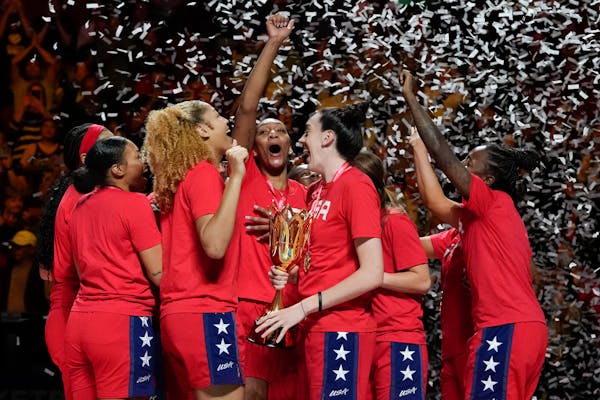 See
more of the story
See
more of the story
The 1992 men's USA Olympic basketball team is known as The Dream Team.
For good reason.
Eleven future Hall of Famers (and Christian Laettner) won eight games at the Olympics by an average margin of victory of 45 points, frequently dunking on and embarrassing overmatched players in a show of force that was both impressive and frequently downright unsportsmanlike.
To build The Dream Team, USA Basketball assembled a team like no other (plus Christian Laettner).
How about this for a starting five: Magic Johnson, Michael Jordan, Charles Barkley, Larry Bird and David Robinson. Or this five: John Stockton, Scottie Pippen, Clyde Drexler, Karl Malone and Patrick Ewing.
The 11th player was Hall of Famer Chris Mullin. The 12th player was intended to represent college basketball, and thus was added Laettner, a great player at Duke who also eventually played, sort of, for the Minnesota Timberwolves.
This team practiced together extensively, and Jordan, perhaps the greatest player of all time, was at the height of his powers, dominating scrimmages even against his great teammates.
The coach, Chuck Daly, would become enshrined in the Hall of Fame, along with two of his assistants, Lenny Wilkens and Mike Krzyzewski.
There had never been a team like that, and there may never be another team like that.
Correction: Add the word "men's'' to that sentence.
That team, given every competitive advantage, won the gold medal in Barcelona by going 8-0 and winning by an average of 45 points per game.
Lynx coach and General Manager Cheryl Reeve did not have a dream team, or a dream situation, going into the FIBA World Cup in Australia. She's the coach of Team USA and is preparing for the 2024 Olympics in Paris.
She was without Brittney Griner, the star center who was a dominant force at the Tokyo Olympics and is now imprisoned in Russia, and also without Team USA stalwarts Diana Taurasi and Sue Bird.
She was without Lynx star Napheesa Collier, who won gold in Tokyo, and Elena Della Donne, an ideal substitute for Griner.
She also began the tournament without key players who competed in the WNBA playoffs, including A'Ja Wilson, Brionna Jones, Kelsey Plum and Chelsea Gray.
Despite a revolving roster, the equivalent of graduating seniors, late-arriving stars and improved competition in women's basketball, Team USA won six games by an average of 40 points on its way to a fourth consecutive World Cup gold medal.
That is remarkable dominance under ideal circumstances. Under these circumstances, it puts yet another women's Team USA squad on a similar footing with the infamous men's Dream Team.
Reeve's team received little attention in the United States, in part because the games were played late at night or early in the morning U.S. time, and in part because women's sports have to work harder to get their due.
If these games had occurred in Minneapolis, we would have been writing about the dramatic midcareer improvement of Gray and Plum.
Both always have been useful players. Now they're stars.
Gray this season set a career-best assist rate, at 6.1 per game. In the postseason, a career 38% three-point shooter made 54% of her three-pointers, many under duress and in clutch situations.
Plum has increased her scoring average from 8.6 points to 14.8 to 20.2 over the past three seasons. She won gold in Tokyo in three-on-three basketball, and the shooting precision and sheer conditioning required to thrive in that event translated beautifully into Becky Hammon's Las Vegas offense, which requires a fast pace and long-range shooting.
Gray and Plum combined with the great Wilson to win the WNBA championship.
The '92 men's dream team played defense when in the right mood. Reeve's Team USA excelled on defense despite a lot of its players dealing with jet lag and playoff fatigue.
One truism about women's basketball is that countries other than the United States are improving rapidly.
What happened in Australia is proof that Team USA keeps getting better, as well.






